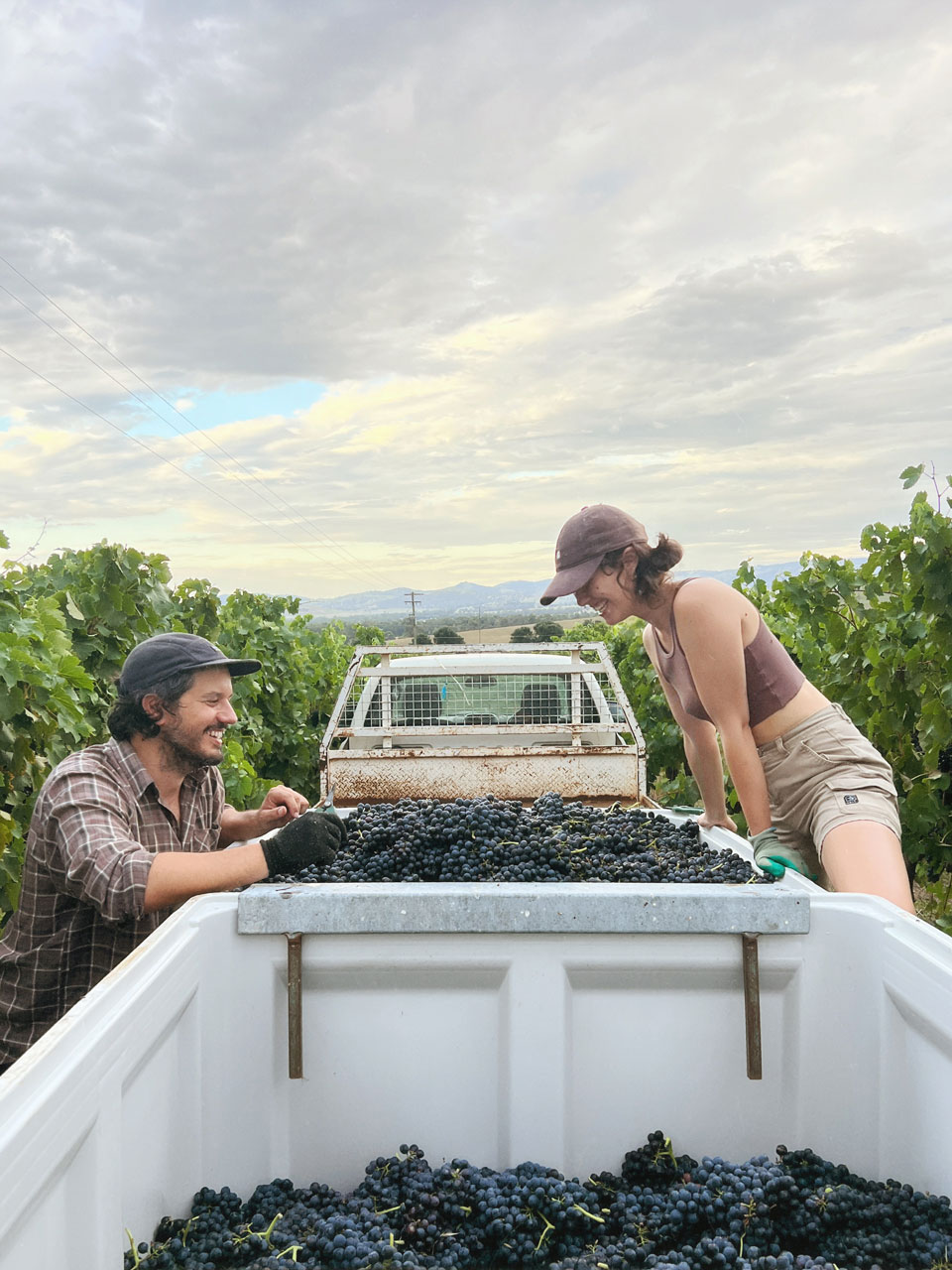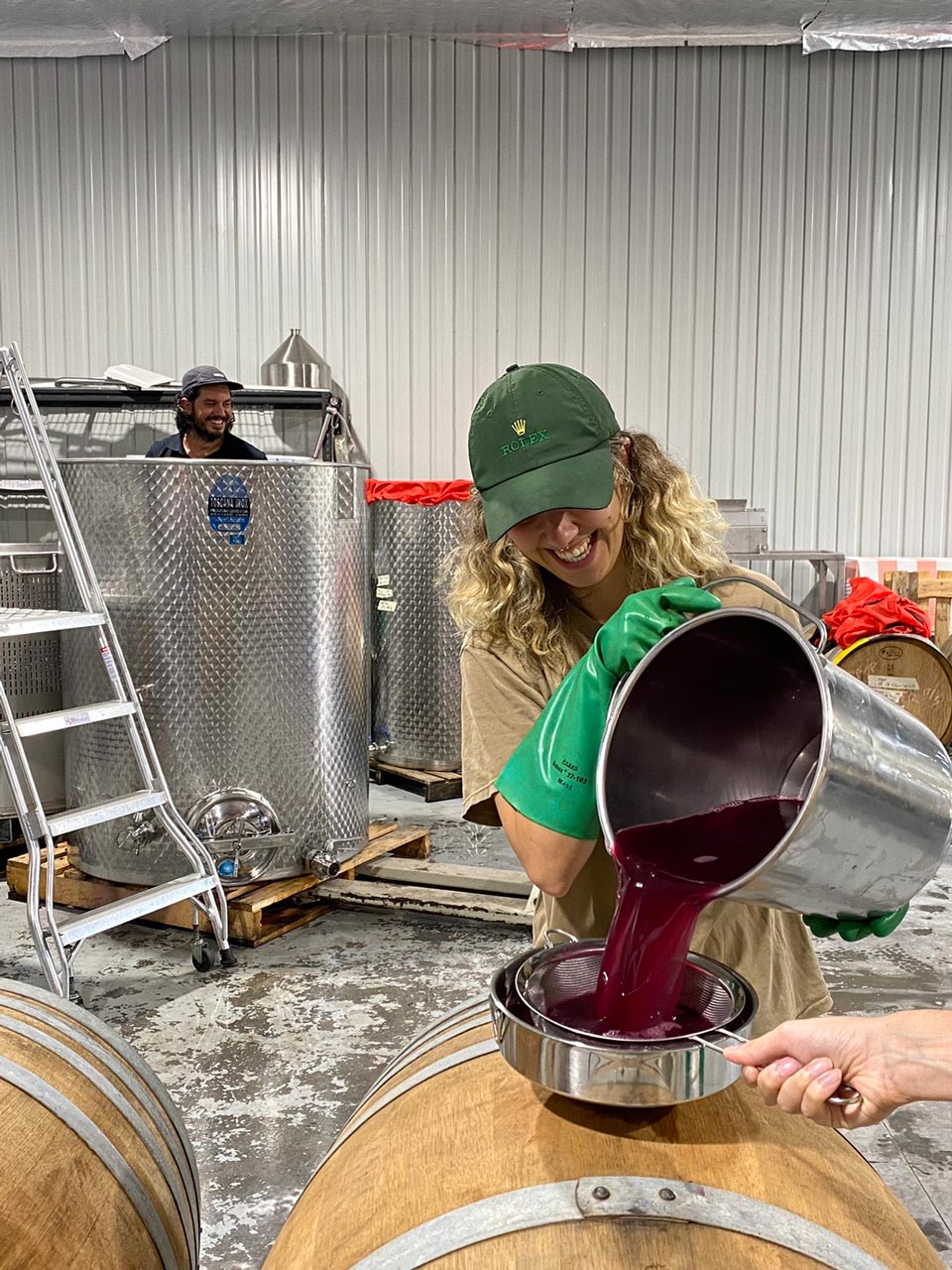Aristotelis Ke Anthoula is Tony Zafirakos’s homage to genuine garage winemaking, as his parents taught him growing up in Sydney. While not all backyard wine passes muster, theirs was one that was much loved by friends and family, which is all the more remarkable given that they never used sulphur. Today, the production has increased somewhat and the winery operations are shared between Zafirakos and Maddison Park-Neilson. There’s a growing number of amphorae in the winery, and the fruit source is no longer the produce market, but the philosophy of his parents continues to this day, with the aim to make high-quality wines with no additions that are not “too polished”. Sourcing fruit from across New South Wales and the Riverland, the wines range from skinsy, pulpy whites, pét-nats and juicy light reds, along with a take on Retsina and a vermouth flavoured with calendula and citrus.
“I started my wine label as a gift to my parents,” says Zafirakos. “They moved here from Greece to raise their family and went through a lot of hardship to give us a good life.” His father, Aristotelis, and mother, Anthoula, like many Greek immigrants, made wine at home. “It is also to acknowledge the rich heritage we have of winemaking in our suburban immigrant communities that often go unnoticed,” he continues.
“Since the early 80s, they made wine with no additions in the eastern suburbs of Sydney. Just before Easter each year, Greek and Italian expats would descend on Sydney’s Flemington Markets as the grapes would come in… We would buy enough to make a barrel of red and a barrel of white each year, stomp it all in the backyard and gravity feed it down to the cellar we had under the house. My parents were not trained winemakers, but they knew enough from having grown up in small villages in wine regions back home.”
That no-addition policy carries through to this day, with Zafirakos saying that sulphur has never been used in the winemaking or bottling process. “We make delicious wine from grapes with no additives or heavy manipulation. All our wines are small batch and made with respect to the winery’s origins as a garage operation. We only use old oak, stainless steel and amphoras to mature our wine in, generally aiming for élevage in vessels that are flavour neutral. We aim to make high-quality wines without pushing them into being too polished.”
Unsurprisingly, the thing that has changed is the fruit source, with the market sidelined for vineyards across New South Wales as well as South Australia’s Riverland, working with Ricca Terra’s Ashley Ratcliff to source vermentino and zibbibo, with the latter used for their homage to Retsina. “Our vision for the future is to bring our passion full circle by making wine from grapes grown by us in our new home on the far south coast of NSW,” adds Zafirakos.
The “small home vintage” was a part of growing up, and it continued into adulthood. It was never intended to be a career, though. “As they approached retirement in the early 2010s, I thought it would be a great little retirement project for them if we made a bit more wine to sell to friends – it had been their dream to own a winery. So, we bought a few small tanks and some extra barrels, and it just grew from there.”
To add to what he had learnt from his parents, Zafirakos began working vintages in Europe, and, in his words, he was hooked. Those wineries all have a ‘natural’ lean, including Jacopo Batista’s Ajola and Australian expat Patricia Nelson’s Gazzetta, both in Umbria, Italy, as well as 2Naturkinder with Michael and Melanie Voelker in Franconia, Germany.
In 2016, it became clear that wine had an irresistible pull, and he has not looked back, with his partner Maddison Park-Neilson joining the operation full-time in 2020. She works in and manages the winery and vintage staff as well as the sales side of the business.
“We still buy all our fruit in, but we have been fortunate to be able to move the needle on this. As of vintage 2022, all our fruit has been organically grown (though uncertified, which is the next challenge!), and almost all of it from vineyards that were previously farming conventionally. I have always believed that we have to work with people to create change, and this is a great example. Rather than sourcing fruit from existing organic sources, it was much more impactful to bring growers along on our journey.”
The operation was recently moved to the far south coast of NSW, which Zafirakos says has a handful of small wineries across a large area. “One of them has just been saved from the brink recently, and another has just decided to pull their vines out. But being near the ocean suits our style of wine and ethical choices. The wines are generally light, savoury, complex and work very well with the coastal cuisine around us.”
The long-term plan is to grow a small selection of their own grapes sustainably on their property, while also encouraging other growers to improve their practices. “We hope that within the next five years we will establish our vineyard here on the south coast of NSW, with the vines/wine playing one part of a greater small-scale farm project. We would love to still be working with the fruit we currently work with but also add on a small parcel of our own estate grown fruit as well. The signs so far are super positive – we have 200 young vines in our nursery block that are absolutely thriving.
“The climate has been viewed as too hard to grow quality grapes organically, given the disease pressure, so we have started a small nursery block of various disease resistant hybrids as well as a few less-disease-susceptible vinifera varieties with the aim of changing this perception in the long term.”
Zafirakos notes that there are wineries doing similar things in the USA, Canada, Japan and some of the colder and wetter parts of Europe, including Germany and the UK. “This is really inspiring and truly focuses on the idea of growing the right thing in the right place. A lot of what we do is informed by our commitment to sustainability and striving for a better future for our environment and the ocean helps to remind us of the importance of this goal as well as to inspire action.”
One of the biggest challenges they have faced along the way has been the plethora of vineyards planted to popular varieties, rather than ones that suited the climate. “Over time we have mitigated this by finding sources of alternative varieties and also homed in on optimal picking times and vinification techniques to combat this,” says Zafirakos. “The most suitable fruit for us are varieties that hold their acidity, whether it’s because of the cooler climate of the Canberra region for example, or the variety selection at Ricca Terra Farms, as well as sound farming practices that generally mean the grapes are in good health and balance.”
Zafirakos stresses that as their project has grown, retaining the ethos of where it started is critical. “High-quality wine, made slowly with care, with the same intentions my parents had when they started making wine a few decades ago,” he says. “It has also been important to me to represent the experience of Australia’s immigrant community. Just like the food culture in Australia, the various waves of migrants have brought so much to our wine heritage, and I have always been fascinated by the myriad of home winery operations that exist in backyards and garages over the entire country. I want to give a voice to that.”




